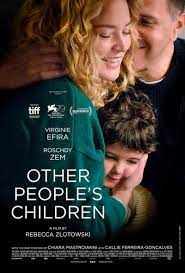
OTHER PEOPLE's CHILDREN/ LES ENFANTS DES AUTRES
France, 2022, 103 minutes, Colour.
Virignie Efira, Roschdy Zem, Chiara Mastroianni, Callie Ferreira-Goncalves, Yamee Couture, Sebastien Pouderoux, Frederick Wiseman.
Directed by Rebecca Zlotowski.
This is a very personal film by writer-director, Rebeccaatowski, reflecting on her own experiences, family (and casting her father as the father of the leading character, Rachel), on not having children, the emotional consequences for a woman, and exploring the maternal instinct. This is very much a film by a woman, for women, and an alert to the male audience, something of a plea for understanding.
The setting is Paris, ordinary life, homes and apartments, school. Rachel is played by Virginie Efira, prominent in French films in recent years. She is a strong screen presence, at times what might be described as “luminous”. While we observe her initially, we begin to identify with her, share her experiences – and the issue of working with other people’s children. Rachel is in her 30s, moving towards 40, time running out for her to have a child (and, later, a revelation that she had an abortion earlier. Interestingly, Rachel is from a Jewish family, goes to the synagogue with her father and sister, and has a discussion about Jewish tradition on abortion, whether the fetus can be considered a person, the father is suggesting that the tradition says that it is not – but that Jewish tradition is against child killing.) We see her as a dedicated teacher in her school, concerned about the students, especially a young boy, teenager, Dylan, difficult family background, not doing well at school, the staff meeting urging that he not return to school, Rachel organising a placement for him, pleading that he is the kind of student that the school should be working to support. It is clear that in her professional life, Rachel is dedicated to other people’s children.
Rachel becomes involved with an engineer, Ali (Roschdy Zem), separated from his wife, sharing the custody but much responsibility for his five-year-old daughter, Leila (quite a striking performance from the young Callie Ferreira-Goncalez). There is an intensity about Rachel’s commitment to Ali and, especially, to Leila, other people’s children. Leila is quite a wilful little girl, critical of Rachel and her presence, wanting her mother, but gradually getting used to Rachel’s presence, even doing a drawing which he presents to Rachel showing Rachel closer to her than her mother. Will her teaching and her relationship with Ali and Leila be Rachel’s fulfilment?
There is a further emotional complication when Rachel’s sister becomes pregnant and gives birth, Rachel a devoted aunt.
But, can this last? There is pain and pathos for Rachel, Ali making a decision for his wife, Rachel and the pathos of the farewell to Leila. The suggestion of a possible pregnancy – but only possible.
And that is how the film itself ends – but, there is an unexpected epilogue, very nicely judged, Rachel older and accepting her life, continuing her teaching, but being affirmed by her student, and her knowing her life is for other people’s children.
1. The title, tone, significance? Is focused on the character of Rachel, her experiences, motherhood, not having children, caring for other people’s children?
2. The Paris settings, homes, schools, the streets, outings, hospitals, doctors rooms? Realistic feel? The musical score? The Vivaldi, Doris Day singing Again? The final credits joy and song?
3. The writer-director, female, writing and directing at 40, her experience, family, the casting of her father as Rachel’s father, her sensibility, her sensitivities? Understanding female characters? Understanding male characters? Audience identifications?
4. Rachel story, Virginie Efira’s screen presence, luminous, sympathetic, strong, tender, assertive, vulnerable? Her age, the revelation about her past, relationships, pregnancy, abortion? Jewish background? At the synagogue, the prayer, her father and sister? The discussion about the Hebrew tradition and abortion, the life of the fetus, not alive, the crime of killing children? Rachel and her work at school, concerned for the students, Dylan and his placement, with Ali, its not working out, the staff discussion about him, her plea, they’re accepting him (and the epilogue)?
5. Her relationship with Ali, his marriage, failing, Leila, at five, in love with Ali, time with him, the outings with Leila, her criticism of Rachel’s always being there, Rachel and the hurt, the gradual change, Leila taking Rachel for granted, wanting her presence, at the judo lessons, driving the car and her being sick, the impact of the crash, the drawing and Rachel’s place in it? Her meeting Alice, Alice and her friendship, Alice and her friendship with Jean, the illness, her death? The prospect of a future with Ali and with Leila?
6. Ali, the meetings with Alice, going to Alice’s parents for Leila’s birthday, his return, breaking with Rachel, his love for her, his love for Leila?
7. The impact on Rachel, her wanting a child with Ali, her being hurt? The meetings with Alice? The farewell to Leila? The encounter with Paul, from school, consolation, sexual encounter? The possibility of her being pregnant, going to the doctor, his sympathy?
8. Rachel sister, the bond between them, her pregnancy news, Rachel and her happiness, the time of the pregnancy, the birth? Later with the child, Rachel looking after her, the photographer?
9. Rachel, age, too late for children?
10. The film ending – the surprise of the epilogue, Dylan and his story, Rachel listening, her joy in his success, her walking away – and her being satisfied with her teaching, her care, her commitment to other people’s children?